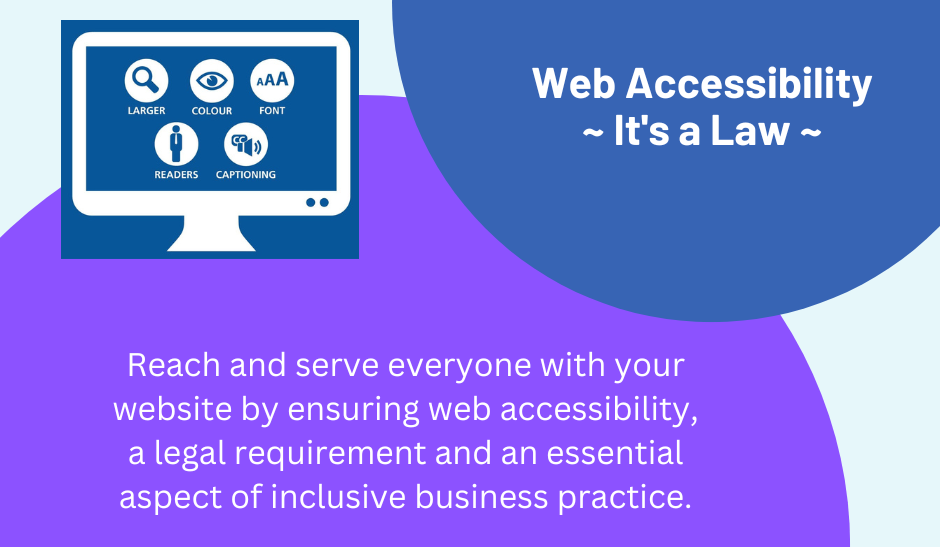Web Accessibility - It's a Law and Best Practice

Legal compliance and best practices for accessibility
In the current digital era, having a website is vital for your business to broaden its customer base and reach a larger audience. As a business owner, it's essential to recognize the significance of making your website accessible to everyone, including those with disabilities. Ensuring web accessibility is a legal obligation and an integral aspect of inclusive business practice. This article delves into the importance of ADA compliance for inclusive business practices, ways to make your website ADA-compliant, the benefits of web accessibility, and best practices to ensure web accessibility for all users.
Web Accessibility and the Law
Web accessibility refers to the practice of designing and developing websites that are usable by people with disabilities. The goal is to ensure that web content and features are available to everyone, regardless of their abilities, including those with visual, auditory, physical, and cognitive disabilities.
The Americans with Disabilities Act (ADA), a federal law enacted in 1990, prohibits discrimination against individuals with disabilities in all areas of public life, including employment, transportation, and access to public places. In 2018, the ADA's scope was interpreted to include websites. As a result, businesses must ensure that their websites are accessible to all users, including those with disabilities.
In recent years, web accessibility lawsuits have increased sharply. According to Accessibility.com, there were 2,387 ADA web accessibility lawsuits filed in the United States in 2022. These lawsuits typically target businesses and organizations that have websites that are not accessible to people with disabilities. Failure to comply with the ADA can result in significant financial penalties and harm a business's reputation.
To make websites more accessible, the World Wide Web Consortium (W3C) has developed the Web Content Accessibility Guidelines (WCAG). These standards provide a framework for making websites more accessible to people with disabilities. While compliance with WCAG is not required by law, it is considered a best practice for web accessibility.
How to Make Your Website ADA Compliant
Ensuring that your website is ADA compliant is essential to provide equal access to all users can be achieved by following best practices for design and development, including using clear and straightforward language, providing alternative text for images, and using headings to structure content. Optimizing your website for mobile users is also crucial, which can be achieved through responsive design, clear navigation options, and optimized images.
It is important to understand the needs of disabled users to make your website accessible. This involves considering a range of disabilities, including visual, auditory, physical, and cognitive disabilities. For instance, providing alternative text for images is essential for users with visual impairments, while captions and transcripts for videos are important for users with auditory impairments.
To determine whether your website is accessible, you can conduct an accessibility audit using tools such as the WAVE Accessibility Tool and the Web Accessibility Evaluation Tool (WAVE). If you face challenges achieving ADA compliance, consider hiring an ADA compliance professional with experience making websites accessible to individuals with disabilities.
Benefits of Web Accessibility
There are several benefits to making your website accessible, including avoiding potential litigation, improved SEO ranking, expanded customer base, and tax benefits.
One of the key benefits of web accessibility is improved SEO. Search engines like Google prioritize websites that are accessible and user-friendly, which can increase your website's visibility online. By implementing best practices for accessibility, such as providing alternative text for images and ensuring that multimedia content is accessible, you can improve your website's SEO and reach a wider audience.
Another critical reason to prioritize web accessibility is to create a more inclusive online environment for all users. By complying with laws and regulations that enforce web accessibility, such as the Americans with Disabilities Act (ADA), you can protect your business from legal liability and ensure that your website is accessible to everyone. This helps you avoid legal action and fines, promotes inclusive business practices, and boosts customer satisfaction and brand reputation.
Ultimately, a website accessible to everyone can help you reach a wider audience, including people with disabilities who may have been excluded in the past. Creating an inclusive online environment shows that you value diversity and are committed to building a welcoming space for all users. This can ultimately lead to increased revenue for your business.
In addition, complying with web accessibility standards and the Americans with Disabilities Act (ADA) not only offers an inclusive experience to people with disabilities but can also entitle your business to a tax credit under Section 44 of the IRS Code. The Disabled Access Tax Credit is available to any company or agency with an accessible, compliant website and total revenue of $1,000,000 or less in the previous tax year or 30 or fewer full-time employees. This credit can cover 50% of the business or agency's expenditures in a year for up to $10,250, which can be used to remove architectural barriers in facilities, assistive equipment or services or hire consulting services. In essence, investing in web accessibility not only helps others but also reduces the financial burden for businesses and agencies. Learn more here - https://archive.ada.gov/taxcred.htm.
Web Accessibility is an Inclusive Business Practice
In conclusion, web accessibility is crucial for inclusive business practices, legal compliance, and user experience. By implementing best practices, conducting accessibility audits, and understanding legal requirements, businesses can create a more accessible and welcoming online environment, leading to increased customer satisfaction, improved brand reputation, and, ultimately, increased revenue. To learn more about web accessibility for your business, visit https://www.jltwebsolutions.com/web-accessibility
Follow and Like Us







